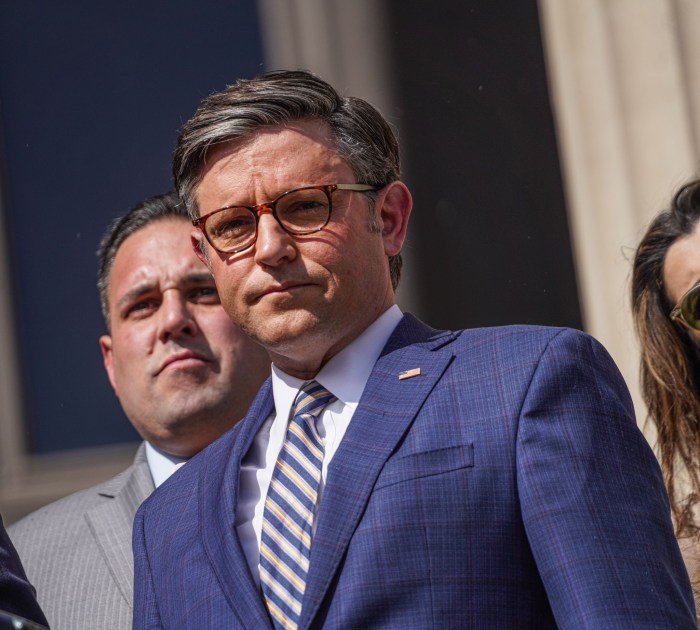By Matthew Monks
“You come in here an hour, an hour and a half to smoke and then go,” Alali said, exhaling a plume of smoke Monday in the Egyptian Cafe near 25th Avenue.
City health officials have taken steps recently to snuff out hookah smoking at more than a half dozen shisha cafés in Little Egypt in Astoria, a move that disturbs regular patrons like Alali, café owners and at least two local legislators.
The New York Health Department has issued summonses to several of the bars in recent months for violating the city's stringent, year-old smoking laws, according to City Councilman Peter Vallone Jr. (D-Astoria) and state Assemblyman Michael Gianaris (D-Astoria).
The legislators sent a joint letter last week to the city health commissioner, arguing that the cafés are similar to cigar bars and should be exempt from the smoking laws.
“What's happening here is that these bars were overlooked when the (city and state Clean Air Act) law was written,” Vallone said. “They should have been exempt under the tobacco bar exemption, but the problem is they don't sell alcohol.”
A tobacco bar is exempt from the smoking laws if it earns 40 percent of its annual income from alcohol sales and 10 percent from tobacco sales, Vallone said. Most of the shisha café patrons are Muslim, he said, and their religion prevents them from drinking alcohol so the shops do not serve any.
“Now I don't think anyone should be punished for not serving alcohol. They should be rewarded,” Vallone said. “I've asked the city to stop issuing summonses until the situation is resolved.”
In a written response to Gianaris, Assistant Health Department Commissioner Elliot Marcus said hookah bars have two options if they want continue renting water pipes and selling tobacco. They can start selling alcohol to become classified as a tobacco bar or stop selling food and drink to qualify as a retail tobacco store, which primarily sells tobacco products and accessories.
Hookah shops that currently sell coffee, tea or juice would have to surrender their food service permits to skirt the smoking laws, his letter states.
Bureaucratic red-tape has cornered the hookah bars into a catch-22, Gianaris said. He said he does not understand how any city official could reasonably apply the Clean Air Act standards to the shisha cafés given their cultural significance. The assemblyman said he will continue to pressure the city to grant cafés exemptions and said he will discuss the issue with the mayor this week to speed things along.
If the city refuses to grant exemptions, he said he might take action at the state level to protect the cafes.
“I hope they (city health officials) come to their senses and stop cracking down on these places,” Gianaris said. “Their sole purpose is to provide a place for people to come and smoke the hookah.”
Since every customer of the Egyptian Cafe comes there to puff on a hookah, the smoke does not infringe on the rights of other patrons, bar owner Lalib Salama said. This is what sets his establishment apart from bars and restaurants, which draw both smokers and non-smokers.
Salama has received four summonses for smoking violations in the past year. The first three came immediately in the wake of the smoking ban and were dismissed, he said.
After the initial rush of summonses, he said, city inspectors were lenient for the better part of a year, ignoring blatant smoking violations on at least three visits. But four days after a January inspection, he got a summons in the mail for failing “to make a good faith effort to notify a person who was smoking in a prohibited area that he was violating the smoke-free air act,” according to the summons.
Salama does not understand why the city recently began enforcing the ban, and he believes that the row of shisha bars are being unfairly singled out. Vallone, however, said that Mayor Michael Bloomberg is stepping up enforcement throughout the city, and the assemblyman has fielded calls from several bar owners who think they are being singled out.
Salama' s citation carries a penalty of up to $1,000 and he plans to contest it when he appears in court next week. He should be exempt from the smoking ban, he argues, because he earns nearly 90 percent of his revenue from tobacco sales, well over the 10 percent minimum.
He said his customers will continue to smoke, and he intends to keep his doors open even if it means applying for a liquor license to meet the exemption. As a Christian, he said he would have no qualms about selling alcohol to ensure that his community has a place to gather.
“This is what the place is here for,” Salama said, motioning to the men seated around him with hookah pipes between their lips. “If they close this place, everyone is going to go smoke in the house.”
Reach reporter Matthew Monks by e-mail at news@timesledger.com or call 718-229-0300, Ext. 155.






























